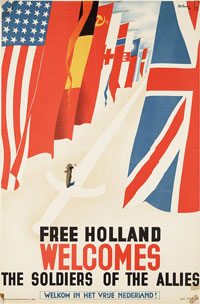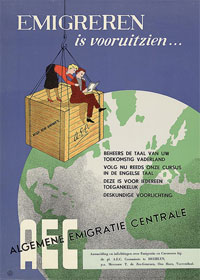After World War II was over, many people wanted to start a new life across the ocean. Five years of war had destroyed the Dutch economy, and it would take years to recover. In the late 1940s and early 1950s, many Dutch people emigrated to Australia, Canada and the United States.
Foreign soldiers and Dutch girls
Starting in September 1944, the allied forces had liberated parts of the Netherlands. It took until 5 May 1945 for the Germans to capitulate and the entire country was free again. The foreign solders, from countries like Poland, Canada, the United States, Great Brittain and Russia, were received very warmly. The Dutch girls were attracted to these brave men in uniforms. Many soldiers had Dutch girlfriends. Several of these romances led to lasting relationships.

Several of these women found themselves with child, and tried to get in touch with the baby’s father. Some of these unexpected fathers sent for their girlfriends and their babies. Other women bore their ‘liberation children’ alone, because they couldn’t find the father or the father wouldn’t recognize the child.
After the war was over, some of these soldiers arranged for their girlfriends to come to them. This happened so often, that the Dutch government made an arrangement with the Canadian government. Canada sent a ship to take the Dutch girlfriends of their soldiers, sometimes together with their Dutch-Canadian babies, to Canada.
Starting a better life
For others began the difficult task of rebuilding the country. The winter of 1944/1945 had been especially severe, and caused many problems in the parts of the Netherlands that had not been liberated yet. Everything that would burn was used for fuel, everything that could be traded for food was traded.
Even though the Marshall Plan helped to rebuild the country and create jobs, many people were unemployed. Through their contacts with their liberators, they knew things were different elsewhere in the World. Many people, especially young families, emigrated to countries such as Australia, Canada or the United States. An article about Dutch emigration to Australia can be found elsewhere on this site.

The trip
Most of the emigrants who emigrated after World War II, left by ship from Rotterdam. The Holland-Amerika-Lijn, a Dutch shipping company, had ships that could transport as much as 2,000 passengers at once. A few years later, flights became affordable. This not only enabled new emigrants to get to their new country quicker, but also enabled the emigrants to visit their relatives in the Netherlands.
Links
- Polygon Journal: Canadian brides (real video)
This Dutch news broadcast video shows the farewell of the Dutch girls who travel to Canada to be with their boyfriends. In Dutch, but the images speak for themselves.


I am looking for a lady in holland that was my father’s girlfriend. My father has passed now but I have been told that this lady had my fathers child. I no little more then her first name and an old picture she sent my father many years ago.
With such little information is it posible to get any information
@Jane Carter
I wrote an article to anwer your question: Reader question: How to find a WWII soldier’s child.
“Hello
My mother is Dutch and before the 2nd world war she believed her grandfather owned farmland and buildings around the province Utrecht Zeist. But when the Germans invaded Holland they took that land.
My question is: was there, or is there, a process to find out what happened to that land? Was land taken by the Germans during the war given back after the war?
Thank you and I look forward to any help you can supply.”
kind regards
Howard catling
My Grandma grew up in the Netherlands during the war and emigrated to the UK in the 1950s. I want to find out more about her family as she never talks much about it.